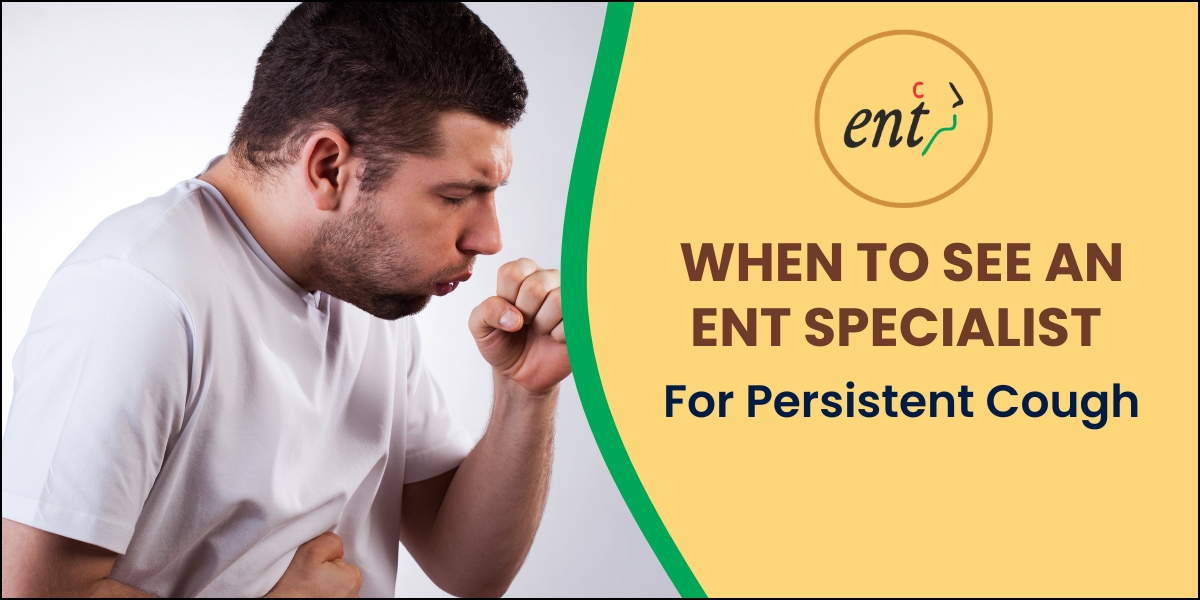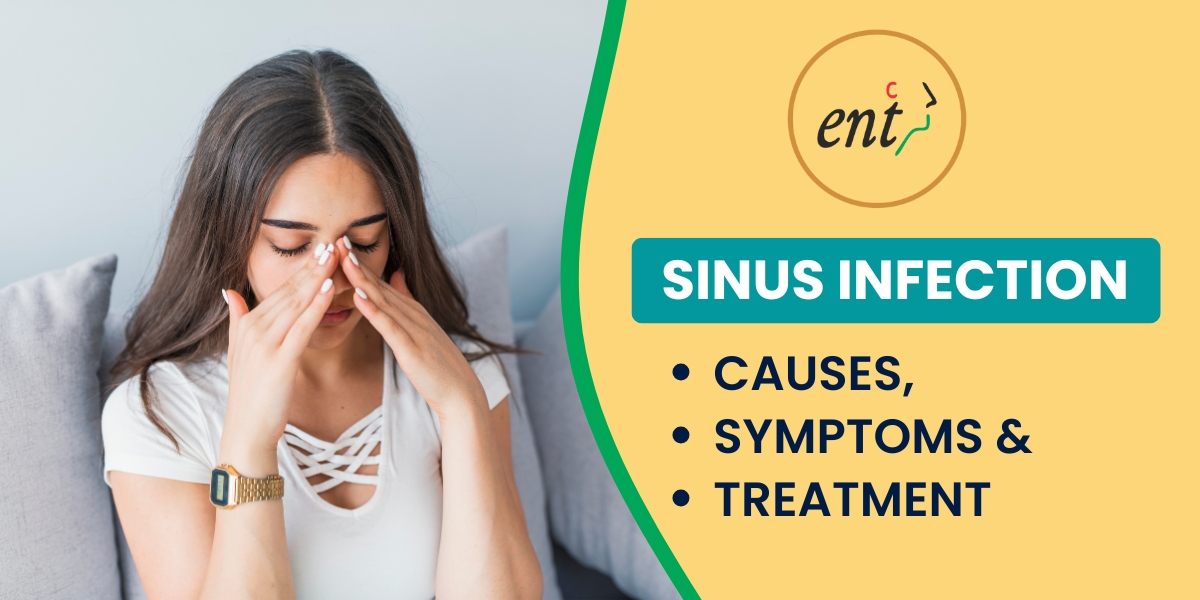When to See an ENT Specialist for Persistent Cough A persistent cough can be more than just a nuisance—it may indicate an underlying health issue that requires medical attention. While occasional coughing is normal, a cough that lasts for weeks could signal a problem that an ENT (Ear, Nose, and Throat) specialist should evaluate. Common Causes of Persistent Cough A cough that lasts longer than 8 weeks in adults or 4 weeks in children is considered chronic. Some common ENT-related causes include: Postnasal Drip – Excess mucus from allergies or sinus infections can irritate the throat. Acid Reflux (GERD/LPR) – Stomach acid flowing back into the throat can cause chronic coughing. Chronic Sinusitis – Long-term sinus inflammation leads to persistent throat irritation. Laryngopharyngeal Reflux (LPR) – A silent reflux affecting the voice box and throat. Vocal Cord Dysfunction – Abnormal vocal cord movement can trigger coughing. Upper Respiratory Infections – Lingering infections may cause prolonged coughing. Allergies & Asthma – ENT-related allergies can contribute to chronic cough. When Should You See an ENT Specialist? ✔ Lasts more than 3-4 weeks without improvement✔ Is accompanied by hoarseness, throat pain, or difficulty swallowing✔ Produces blood or unusual mucus✔ Worsens at night or after meals (possible reflux)✔ Is linked to sinus pressure, nasal congestion, or postnasal drip How an ENT Specialist Can Help 🔹 Physical examination of the nose, throat, and ears🔹 Endoscopy to check for throat or vocal cord issues🔹 Allergy testing if allergic triggers are suspected🔹 Imaging tests (X-ray/CT scan) for sinus or airway problems🔹 pH monitoring to detect acid reflux Treatment may include medications, lifestyle changes, allergy management, or surgical interventions if necessary. Visit Dr. Rohit Prasad – ENT Specialist in Bhosari? If you’re struggling with a persistent cough, Dr. Rohit Prasad, a trusted ENT specialist in Bhosari, offers expert diagnosis and personalized treatment. With advanced ENT care, you can find relief from chronic cough and related conditions. Recent Post When to See an ENT Specialist for Persistent Cough Hearing Loss in Adults: Early Signs and Next Steps Sinus Infections: Causes, Symptoms, and Effective Treatments Common ENT Problems in Children: What Parents Need to Know Ear Infections: Causes, Symptoms, and Treatment Options contact us Name(Required) First Phone(Required)Your Message(Required)CAPTCHA
Hearing Loss in Adults: Early Signs and Next Steps
Hearing Loss in Adults: Early Signs and Next Steps Hearing loss is a common yet often overlooked health issue among adults. Many people ignore the early signs, assuming it’s a normal part of aging or a temporary problem. However, untreated hearing loss can lead to social isolation, cognitive decline, and reduced quality of life. Recognizing the early symptoms and taking prompt action can make a significant difference. If you or a loved one is experiencing hearing difficulties, Dr. Prasad ENT Hospital in Bhosari and Moshi offers expert diagnosis and treatment to help restore hearing health. Early Signs of Hearing Loss in Adults Hearing loss can develop gradually, making it difficult to notice at first. Here are some common early signs to watch for: Difficulty Understanding Speech – Struggling to follow conversations, especially in noisy environments like restaurants or social gatherings. Frequently Asking Others to Repeat Themselves – Needing people to repeat what they said or speaking louder. Turning Up the Volume Too High – Increasing the TV or radio volume to levels others find uncomfortable. Tinnitus (Ringing in the Ears) – Hearing constant buzzing, ringing, or hissing sounds with no external source. Avoiding Social Situations – Withdrawing from conversations due to difficulty hearing. Misunderstanding Spoken Words – Frequently mishearing words or responding inappropriately. Straining to Hear on the Phone – Finding it hard to understand phone conversations clearly. Common Causes of Hearing Loss in Adults Several factors contribute to hearing loss, including: Age-Related Hearing Loss (Presbycusis) – Gradual deterioration of hearing due to aging. Noise Exposure – Long-term exposure to loud noises (e.g., machinery, concerts, headphones). Earwax Buildup – Blockage that temporarily reduces hearing ability. Ear Infections or Fluid Buildup – Infections or Eustachian tube dysfunction affecting hearing. Ototoxic Medications – Certain drugs that damage the inner ear. Underlying Health Conditions – Diabetes, high blood pressure, or cardiovascular diseases. Next Steps: Diagnosis and Treatment If you notice any signs of hearing loss, seeking professional help early can prevent further deterioration. Here’s what you can do: Consult an ENT Specialist – A hearing evaluation by an ENT doctor can determine the cause and severity of hearing loss. Hearing Tests (Audiometry) – Tests like pure-tone audiometry and speech recognition help assess hearing levels. Earwax Removal (If Needed) – A simple procedure to clear blockages. Hearing Aids – Custom-fitted devices to amplify sounds for better hearing. Cochlear Implants (For Severe Cases) – Surgical options for profound hearing loss. Lifestyle Adjustments – Using assistive listening devices and communication strategies. Visit Dr. Prasad ENT Hospital For The Best ENT Care If you are in Bhosari, Moshi, or nearby areas, Dr. Prasad ENT Hospital provides comprehensive hearing care with advanced diagnostics and personalized treatment plans. Our expert ENT specialists are dedicated to improving your hearing health with: ✔ State-of-the-art hearing tests✔ Customized hearing aid fittings✔ Earwax removal and infection treatment✔ Surgical solutions for severe cases Don’t let hearing loss affect your daily life. Schedule a consultation at Dr. Prasad ENT Hospital today and take the first step toward better hearing! Recent Post Hearing Loss in Adults: Early Signs and Next Steps Sinus Infections: Causes, Symptoms, and Effective Treatments Common ENT Problems in Children: What Parents Need to Know Ear Infections: Causes, Symptoms, and Treatment Options Sleep Apnea: Causes, Symptoms & Treatment contact us Name(Required) First Phone(Required)Your Message(Required)CAPTCHA
Sinus Infections: Causes, Symptoms, and Effective Treatments
Sinus Infections: Causes, Symptoms, and Effective Treatments Sinus infections, also known as sinusitis, are a common condition affecting millions of people worldwide. They occur when the sinuses—hollow cavities around the nasal passages—become inflamed or infected. While sinus infections can be uncomfortable, understanding their causes, symptoms, and treatments can help you manage them effectively. What Causes Sinus Infections? Sinus infections can be triggered by various factors, including: Viral Infections – Most sinus infections start with a common cold or flu virus. Bacterial Infections – If a viral infection persists, bacteria can take over, leading to bacterial sinusitis. Fungal Infections – Rare but possible, especially in people with weakened immune systems. Allergies – Pollen, dust, or pet dander can cause inflammation, blocking sinus drainage. Nasal Polyps – Noncancerous growths in the nasal passages can obstruct sinuses. Deviated Septum – A crooked nasal septum can hinder proper sinus drainage. Environmental Irritants – Smoke, pollution, and strong chemicals can irritate sinuses. Common Symptoms of Sinus Infections The symptoms of sinusitis can vary depending on whether the infection is acute (short-term) or chronic (long-term). Common signs include: Facial pain or pressure (especially around the forehead, cheeks, and eyes) Nasal congestion and difficulty breathing Thick yellow or green nasal discharge Reduced sense of smell and taste Headache (often worsening when bending forward) Cough (which may worsen at night) Fatigue and fever (in some cases) If symptoms last longer than 10 days or worsen after initial improvement, it may indicate a bacterial infection requiring medical attention. Effective Treatments for Sinus Infections 1. Home Remedies & Self-Care Steam Inhalation – Helps loosen mucus and relieve congestion. Saline Nasal Sprays – Keeps nasal passages moist and flushes out irritants. Hydration – Drinking plenty of fluids thins mucus. Warm Compress – Reduces facial pain and pressure. Rest – Supports the immune system in fighting infection. 2. Over-the-Counter (OTC) Medications Decongestants – Provide short-term relief from nasal congestion. Pain Relievers – Ibuprofen or acetaminophen can ease headaches and discomfort. Antihistamines – Useful if allergies contribute to sinusitis. 3. Medical Treatments Antibiotics – Prescribed for bacterial sinus infections. Nasal Corticosteroids – Reduce inflammation in chronic cases. Allergy Shots (Immunotherapy) – Helps if allergies are the root cause. Surgery (in severe cases) – For chronic sinusitis, nasal polyps, or structural issues. When to See a Doctor Consult an ENT specialist if you experience: Severe headache or high fever Symptoms lasting more than 10 days Vision problems or swelling around the eyes Recurrent sinus infections Expert Sinus Infection Treatment in Bhosari If you’re struggling with persistent sinus infections, Dr. Prasad ENT Hospital offers advanced and personalized sinus infection treatment in Bhosari. With state-of-the-art diagnostic tools and expert care, Dr. Prasad and his team provide effective solutions, including: Accurate Diagnosis (Endoscopy & Imaging) Medical Management (Antibiotics, Nasal Sprays) Minimally Invasive Sinus Surgery (If Required) Allergy Testing & Treatment Don’t let sinus infections disrupt your life—seek professional help today! Contact Dr. Prasad ENT Hospital for expert care and relief from sinusitis. Recent Post Hearing Loss in Adults: Early Signs and Next Steps Sinus Infections: Causes, Symptoms, and Effective Treatments Common ENT Problems in Children: What Parents Need to Know Ear Infections: Causes, Symptoms, and Treatment Options Sleep Apnea: Causes, Symptoms & Treatment contact us Name(Required) First Phone(Required)Your Message(Required)CAPTCHA



